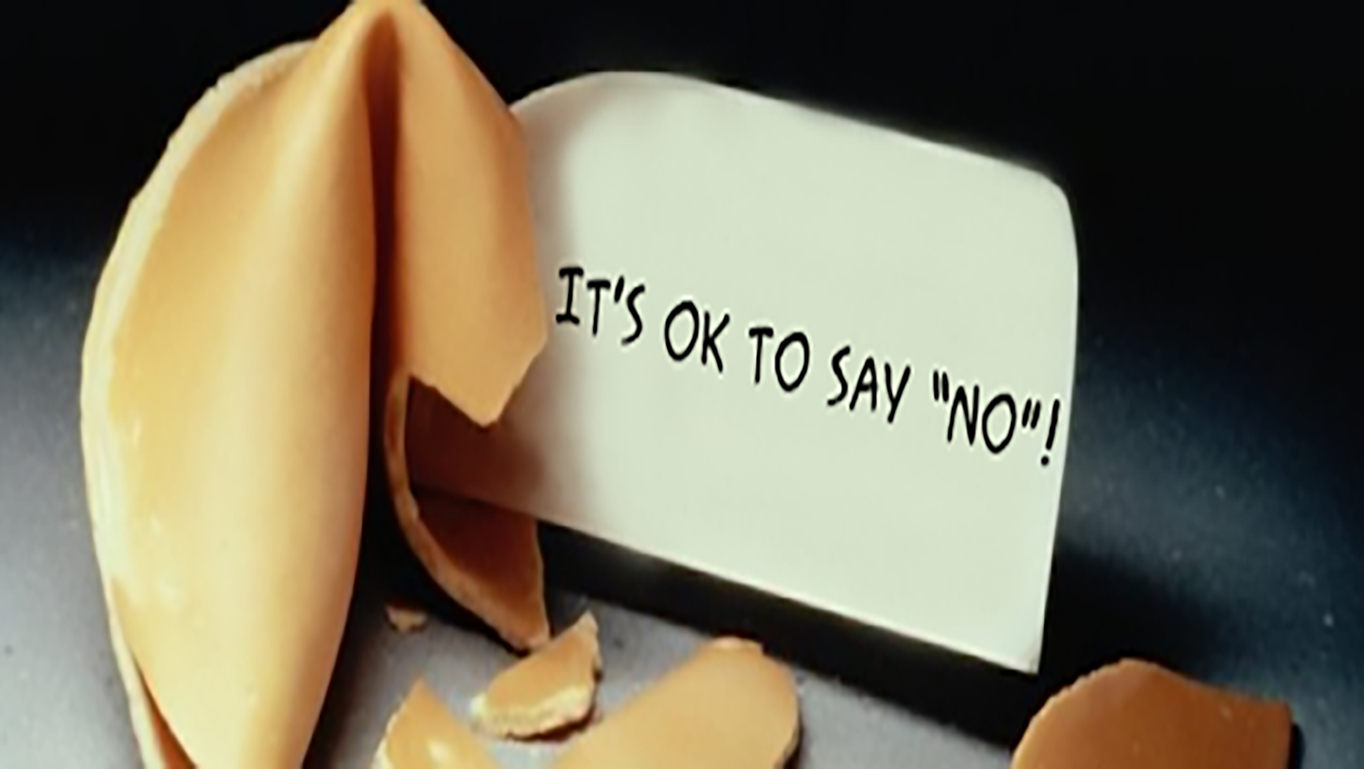13-9, 2 Rio Tower, Persiaran Rio, Bandar Puteri, 47100 Puchong, Selangor, Malaysia.

No-Vember: Learning the Art of Saying No
- On
- InHealth
Picture Source: http://www.successfulbydesign.com/how-to-say-no/
November is another month full of awareness campaigns. We have Diabetes Awareness[1], Men’s Mental Health[2], even World Kindness Day. But one post caught my eye as I was researching on topics to reflect on this month: No-vember, a month to commemorate the assertive art of saying no[3]. Oftentimes we were held up in a bind when people approached us with requests or persuasions but for one reason or another we ended up hesitating or giving in, saying yes, though reluctantly. In this article, we shall have a look at what makes saying no so difficult, the consequences of lacking that autonomy or continuously giving in, as well as solutions to help build that confidence and right, so that we not only take care of our own needs, but others’ as well.
Factors
A paper suggested that a person’s autonomy to say no can be a political and cultural power play[4]. When an organisation or person says no, it is a form of gatekeeping. How they determine criteria for gatekeeping depends on the person’s position in the social hierarchy and cultural norms. For Asian cultures that have a higher power differential, older people, people with higher ranking or longer experience in the working field, or educators are those with authority, whereas younger people, juniors with little experience and students are of lower ranking and have the expectation of following orders and respecting their higher ups. This is because there is a common notion in which seniors are viewed as more experienced and knowledgeable compared to their younger peers, thus deserving of respect and power in decision making, while juniors are seen as commoners or those who do not know any better.
This phenomenon was described to be a norm of unequal power distribution accepted by less powerful peers[5]. Power play is not only happening in workplaces, but also in communities of faiths, schools, social circles, genders, intimate relationships and even families. In Malaysia, we have a staggeringly high power distance[6] compared to other Southeast Asian countries like Singapore and Philippines. This is due to our past feudal system from Malay culture and colonial influences from the British, which gives power to higher ups and commoners as more lowly. Besides that, our local culture is largely patriarchal, in which men are usually the breadwinner of the family, whereas women are traditionally seen handling domestic work[7]. Though there is a growing number of women in the workforce, the gender gap in work wages and policies is still wide[8]. Not only that, only recently, Malaysian mothers won the rights to pass nationality for their children who were born overseas[9]. Before that, only the fathers had the right, and that shows further inequality in power in Malaysia.
As a collectivistic culture, the aim of the hierarchy and modest attitude was to maintain order, harmony and consensus in the organisation. Higher ups would expect loyalty from the lower hierarchy and those under would expect the higher ups to take care of them.[10] When one attempts to challenge authority and the social norms by saying no, it might mean disrupting the semblance of order, or losing the security of being taken care of. Even when it comes to confrontations, though people in Western cultures might find it standard to call others out on their wrongdoing, people in Asian cultures value strong relationship bonds and peace, and would go a roundabout way of resolving conflict by confiding to others they trusted or are on similar levels instead of talking it out directly with the person they are in conflict with[11].
Consequences
While we can still choose to follow through others’ requests, the building up of sacrificing our energy and time for another without caring for ourselves can be detrimental, not only to ourselves, but also towards others. Over time, if we repeatedly say yes to people, the little incidents can build up to feeling unheard, burnout, depletion of our own resources, and even resentment for ourselves or the other party. Not being able to speak up, especially on needs and abuse of power, means perpetuation of the unhealthy cycle. The assumption of people in higher positions being more knowledgeable and having higher power might have the effect of them having less or nothing to improve or work on. Juniors who were seen as less experienced would dare not voice out their opinions for fear of being rejected or being seen as defiant, which leads to lack of innovation and change. While there is much to learn from the West, the hierarchical culture from the East has their own values we could learn from as well. When learning the art of saying no, how do we balance the power distance in our local culture and globalisation from the West?
Solutions
- Know your rights
Though some laws are in the process of reevaluation and amendments[12] [13] [14], it is important to understand what your basic human rights are. Lack of awareness can perpetuate cycles of abuse and exploitation like toxic workplace behaviours, sexual harassment, lower pay wages and working overtime often. While changing work or personal environments might help, it might be a temporary measure if the dominant culture allows such toxic practices. Advocating for your own rights and saying no to certain practices not only benefit the self, but others as well who are going through similar conflicts.
- Setting priorities and boundaries
Oftentimes making decisions for yourself can feel selfish, especially in a society where we value taking care of others, not just physical and emotional needs, but even to the extent of not wanting to hurt their feelings at the risk of sacrificing your own needs. But remember that you have to take care of yourself first before being able to take care of others, much like the analogy of putting on your own oxygen mask first during an emergency in an airplane. Otherwise your quality of life, care and relationships are at risk of deteriorating. If needed, it is okay to say no in order to take care of yourself.
- Know your values, as well others’
Understandably with globalisation, many younger generations might encounter diaspora and adopt more Western values in being more individualistic and outspoken, but it does not mean we have to deviate from our Asian values. Humans are social creatures, and there is wisdom in operating in a collectivistic system by forming communities and caring for one another. By understanding where your values lie, as well as others’, it is possible to say no in a respectful, collaborative manner and at the same time come to a compromise that can benefit both parties.
- Communicate your intentions
After considering your options and other peoples’ needs, the next step to saying no is also to let people know where your no comes from, as well as your needs and possible compromise. Couples therapist Gottman based his communication method on the assertive communication model and encouraged using a softened start-up instead of a harsh one. You can also frame your communication to “I feel…” and “I need…” instead of “You” to avoid blaming or criticising the other person. This method not only works in intimate relationships, but in workplaces as well. You can read further tips here.
- Have a support system, as well as courage
Although direct confrontation can be hard, what more in Asian cultures where we value the status quo and do not want to risk “losing face” of self or others, if needs were communicated but no change or resolution was met, sometimes having a trusted ally can help provide emotional support and another perspective to things. Again, while we are encouraged to be independent, it can also be helpful having social support, be it with friends, family or even professional help. While adding a third party in the conflict may lead to triangulation, one can benefit from the support if things become toxic, harmful, even dangerous, and one is in need of alternatives to change or escape their situation. Examples of harmful situations that can be detrimental to physical and mental wellbeing are being in an abusive relationship or working with an exploitative boss. It takes courage to stand up to the status quo and find our way out of a tight situation, and the effort can be worthwhile, for both self and society.
Saying no takes practice and time. It might feel alien, or even wrong at first, after years of social conditioning in feeling guilt and shame for your own needs. But, like any behaviour and skill, it can be unlearned and relearned. Like any art, take the time to work with what you have. If you still find difficulty communicating your needs, you can work it out and learn in therapy sessions. Skybi offers professional counseling service by mental health professionals. You can sign up for a session here: https://tinyurl.com/49nb69rf
[1]]https://www.niddk.nih.gov/health-information/community-health-outreach/national-diabetes-month#:~:text=November%20is%20National%20Diabetes%20Month,to%20bring%20attention%20to%20diabetes.
[2]https://www.awarenessdays.com/awareness-days-calendar/movember-2021-mens-health-awareness-month/
[3] https://www.no-vember.net/
[4] https://journals.sagepub.com/doi/abs/10.1177/017084068600700206
[5] https://hbr.org/2012/04/in-asia-power-gets-in-the-way
[6] https://www.hofstede-insights.com/country/malaysia/
[7] https://culturalatlas.sbs.com.au/malaysian-culture/malaysian-culture-family
[8] https://www.bernama.com/en/thoughts/news.php?id=2006158
[9]https://www.csmonitor.com/World/Asia-Pacific/2021/0913/Malaysian-mothers-win-citizenship-rights-for-their-children
[10]https://absoluteinternship.com/blog/east-vs-west-5-cultural-differences-international-student-should-know/
[11]https://www.goabroad.com/articles/intern-abroad/east-vs-west-corporate-cultural-differences-for-interns-abroad
[12] https://www.cljlaw.com/?page=latestmyact&mode=desktop
[13]https://www.freemalaysiatoday.com/category/nation/2021/10/07/home-ministry-agc-agree-to-decriminalise-suicide-attempts/
[14] https://www.malaysiakini.com/news/598733




